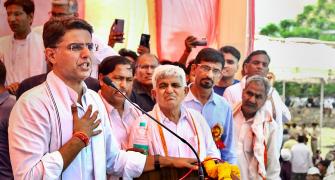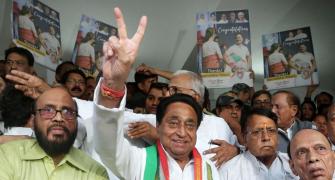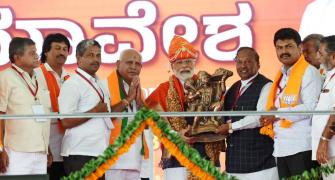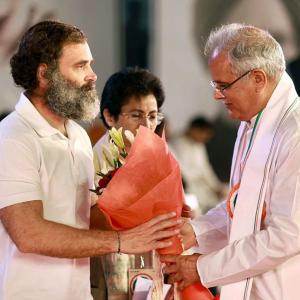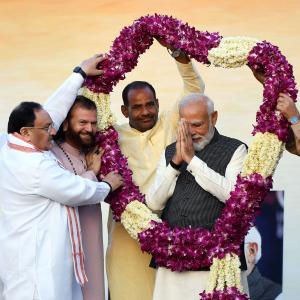It should announce its candidates 45 days before the elections; trust rooted leaders; start its campaign focused on five guarantees six months before elections.
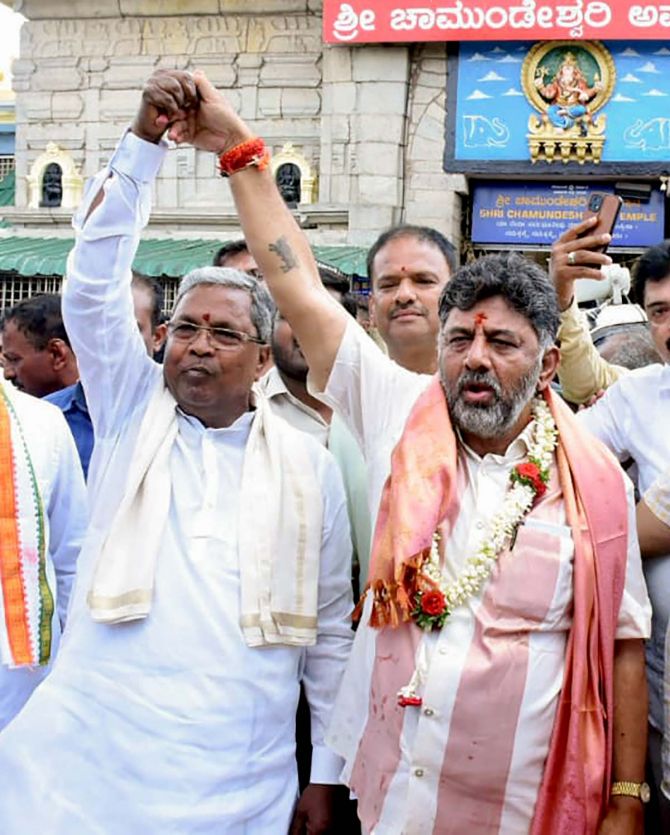
Siddaramaiah is now the state chief minister; Shivakumar its deputy CM. Photograph: ANI Photo
The Congress party's comprehensive Karnataka assembly election win has armed it with an electoral template it is putting to use in Madhya Pradesh -- the only Bharatiya Janata Party-ruled state of the five poll-bound states in November.
The Congress campaign in MP will focus on those affected the worst, across all castes, by inflation and a lack of gainful work and promise Rahul Gandhi's 'five guarantees'.
But the Karnataka win, evident in the four days it took after the election results to agree on a power-sharing formula between Siddaramaiah and D K Shivakumar, brings the challenge of maintaining peace in allocating ministerial berths and portfolios and giving sufficient representation to women and communities that supported the party in the election, such as Scheduled Castes, minorities, and Lingayats.
The government can have 34 ministers, and negotiations are on to agree upon 24 other names.
As political analyst Sandeep Shastri says, while Siddaramaiah and Shivakumar are both from Old Mysuru, coastal Karnataka and central Karnataka are unrepresented, and at least 40 of the 135 MLAs and four/five party MLCs have held ministerial portfolios previously.
Women activists, such as Tara Krishnaswamy, have demanded women's representation, particularly as, according to the Axis post-poll analysis, 11 per cent more women voted for the Congress than for the BJP.
Karnataka elected only 10 women, four each on the Congress and BJP tickets, one on the Janata Dal-Secular ticket, and an Independent.
Some political observers such as Sudheendra Kulkarni have found fault with the Congress central leadership's release of names of the ministers as a 'harmful High Command culture'.
'Is it the job of the Congress president to select ministers in the Karnataka government? Doesn't this undermine the chief minister? On the one hand, the Congress rightly questions Prime Minister Narendra Modi's government's attacks on states' powers. On the other hand, this?' asked Kulkarni.
However, the BJP's Basavaraj S Bommai was perceived as weak because of his frequent flights to Delhi to get approval from his party's central leadership on the shape of his Council of Ministers.
The Congress prospects in the MP and Telangana Assembly polls and the subsequent 2024 Lok Sabha elections hinge on the Siddaramaiah-led government's performance.
Thus, the biggest challenge would be to roll out its ambitious welfare schemes.
'We hope to be the gateway from the South to the rest of India,' Karnataka Deputy CM D K Shivakumar has said.
Siddaramaiah announced his government's decision to implement the party's 'five guarantees' hours after taking the oath of office. Interestingly, the Karnataka government advertised the fact with his picture and details of the five schemes in all leading Hindi newspapers published in North Indian states.
After his government's first cabinet meeting, Siddaramaiah said an estimated Rs 50,000 crore (Rs 500 billion) annually would be needed to implement the five schemes: 200 units of free power to all households (Gruha Jyoti), Rs 2,000 monthly assistance to the woman head of every household (Gruha Lakshmi), 10 kilos of rice free to every member of a below-poverty-line household (Anna Bhagya), Rs 3,000 every month for unemployed graduates and Rs 1,500 for unemployed diploma-holder youths between ages 18 and 25 for two years (Yuva Nidhi), and free travel for women in public transport buses (Uchita Prayana).
While the BJP has questioned how the Siddaramaiah government might raise revenue for the schemes, the fight over welfarism of the two parties started eight years ago with Rahul's April 20, 2015, jibe that the Modi government was a 'suit-boot ki sarkaar' and anti-poor.
The remark had the PM, on May 25, 2015, address a garib jan kalyan rally in Jan Sangh leader Deendayal Upadhyaya's ancestral village to mark the first anniversary of his government and talk about his philosophy of antyodaya, or helping the poorest.
If Modi spent the last eight years trying to displace the Congress as the party for the poor in public perception, the Congress's Karnataka triumph could help the party reclaim that perch.
On May 10, as Karnataka voted, Modi told a BJP rally in Rajasthan that the 'biggest scam of the Congress party was that of poverty eradication or garibi hatao 50 years ago'.
After Siddaramaiah and others took oath in Bengaluru, Rahul said the media had proffered several theories and analysed threadbare the reasons for the Congress' victory.
'There is only one reason for this win: The Congress party stands with Karnataka's poor, deprived, weaker sections, Dalits, and tribals. We had truth and the poor against BJP's money, power, and police,' said Rahul.
The Congress has learned other vital lessons from Karnataka: It should announce its candidates 45 days before the elections, trust rooted leaders, and start its campaign focused on five guarantees six months before elections.
We will know in December how successfully it replicates its lessons.


